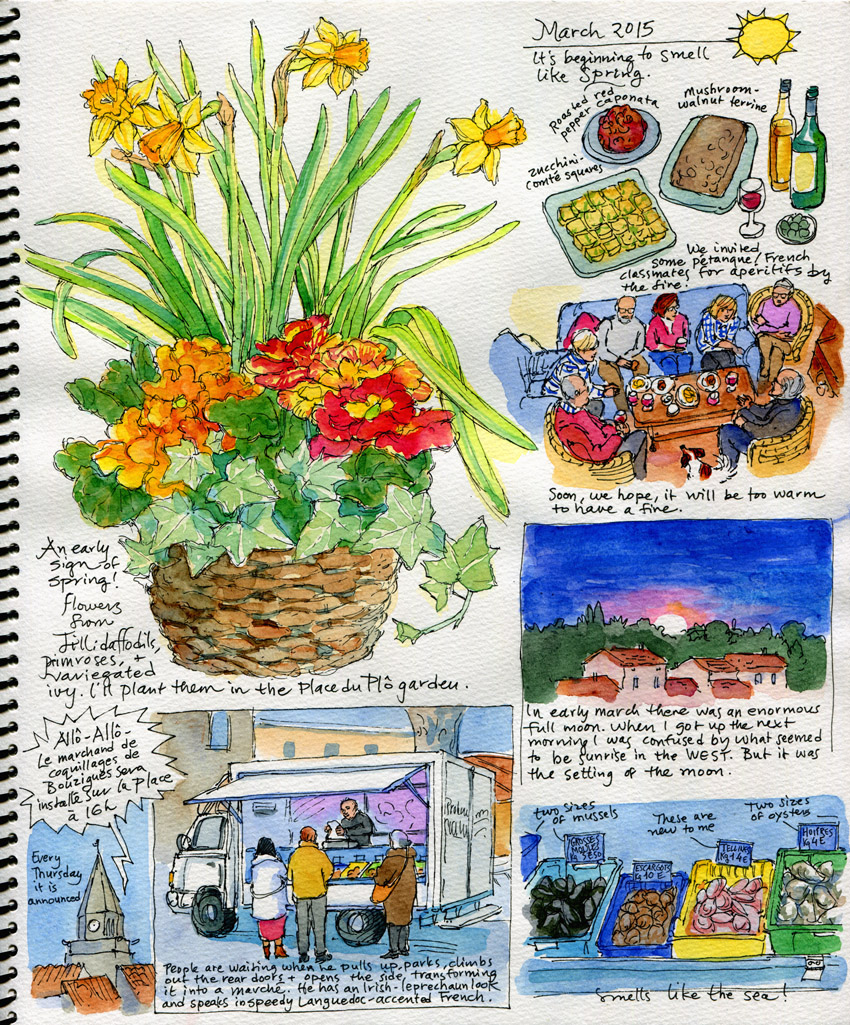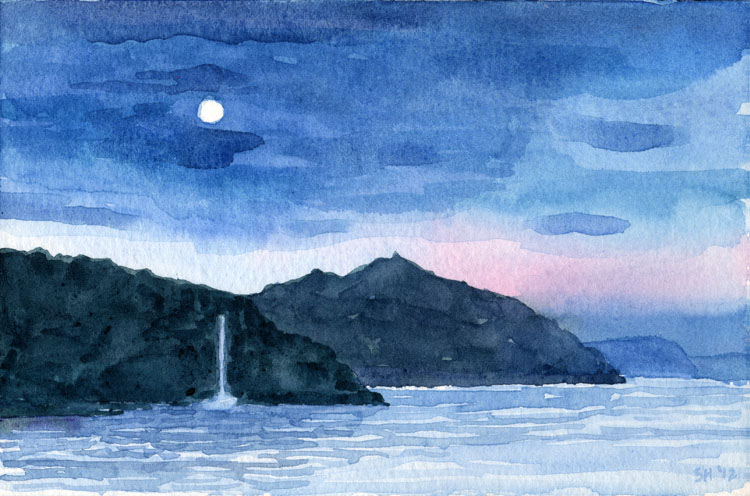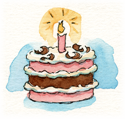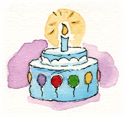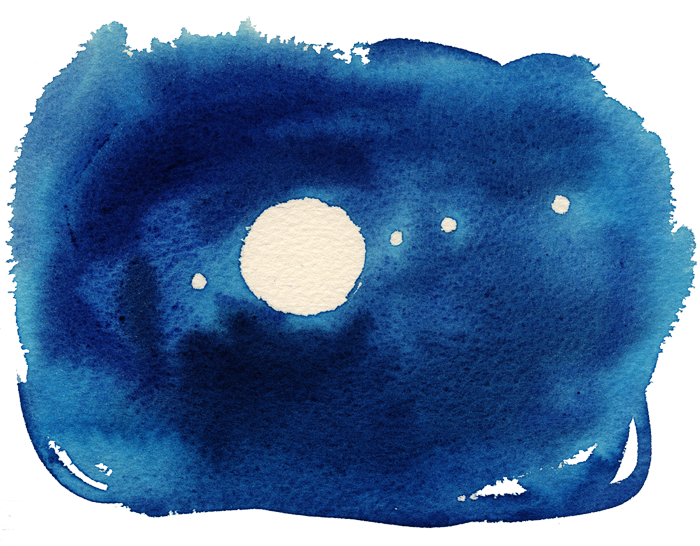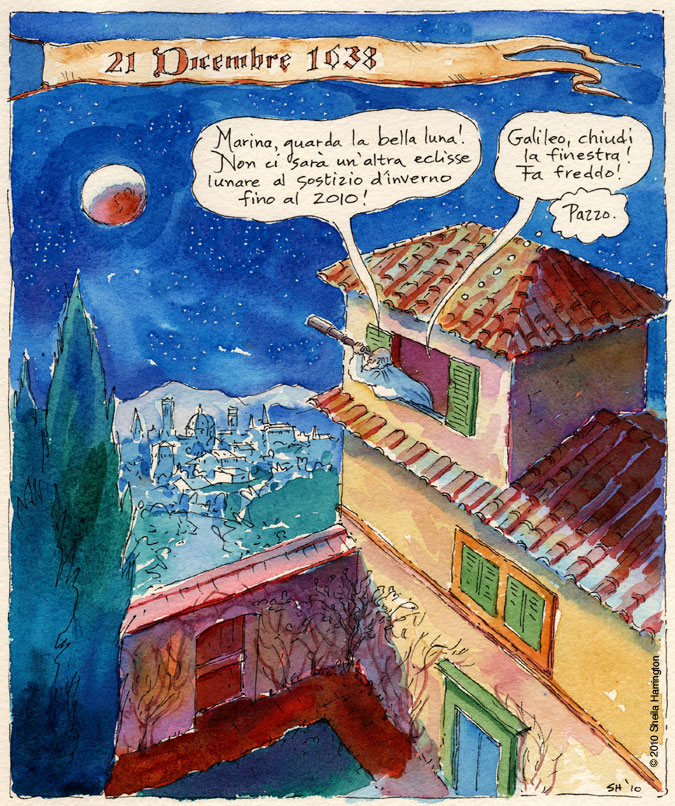Tag: Moon
Moon Over Orcas Island
Keep your fingers crossed for clear skies tonight so you can see the Blue Moon: that is, the second full moon in a single month, which will not happen again until 2015. I post a watercolor of this month’s first full moon (which my daughter and I admired from Orcas Island), on August 2nd, in its honor.
It is a celestial event that seems especially significant in light of the passing on August 25th of Earth’s moonwalker Neil Armstrong—the first human being who could gaze up at the full moon and say, “I was there.”
Dreams
In honor of the birthday today of Langston Hughes, a poem and and a picture. For another Hughes poem, and a mini-bio, please see Rivers.
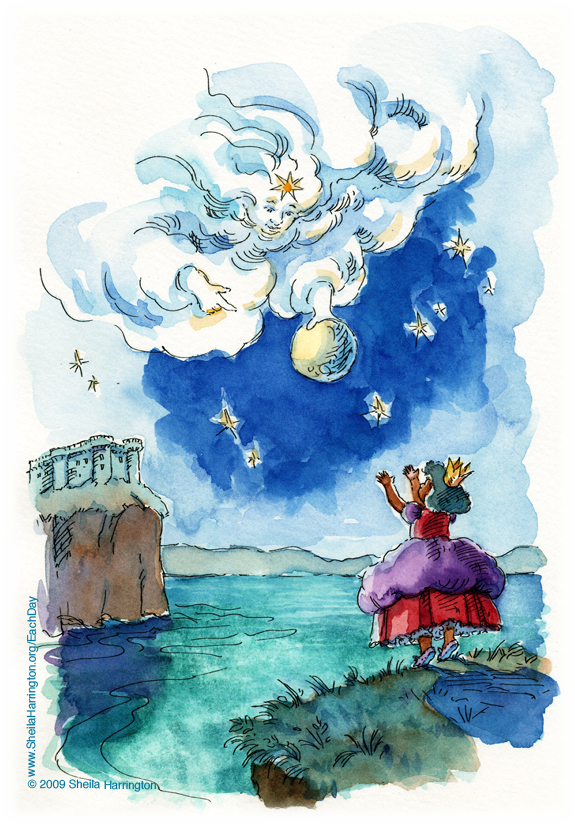
Hold fast to dreams
For if dreams die
Life is a broken-winged bird
That cannot fly.
Hold fast to dreams
For when dreams go
Life is a barren field
Frozen with snow.
—Langston Hughes
Over the Moon/s
Last night at about 9pm my son and I went outside with a pair of ordinary bird-watching binoculars and trained them on a bright starry object we’d been noticing in the western sky during the last dog walks of the evening. And this is what we saw (as best I can recall):
According to the NASA website (whose picture is much better than mine), this is no star, but our giant neighbor Jupiter, with four of its 62 moons: Io, Europa, Ganymede, and Callisto, called the Galilean moons, after Galileo Galilei, who first spotted them in 1610.
Jupiter appears especially bright to us right now because it is both in opposition (directly opposite the sun from Earth, peaking on Oct. 29th Universal Time) and closer to Earth than it will be again until 2022. I don’t know about you, but I find it wondrous that without the aid of observatory or telescope we can see these heavenly bodies from our city street corner. In fact, if Jupiter weren’t itself so bright, we could probably see the Galilean moons without binoculars.
Their appearance left us starry-eyed, and dwarfed the importance of political squabbling, and getting that last load of laundry done, and pretty much anything else.
Triduum
The dates of Passover (Pesach) and Holy Thursday (Maundy Thursday), are both related to the arrival of spring and the phases of the moon, connecting their celebrants with humanity’s remote ancestors, to whom knowledge of the seasons and the heavenly bodies was not merely interesting but vital for survival. Passover begins on the 14th day of the Hebrew calendar month Nisan, which is also the date of the full moon following the vernal equinox; Holy Thursday falls on the Thursday before Easter, which is the first Sunday following the first full moon after the spring equinox. (Whew!) It sometimes works out that they fall, very satisfactorily (to me, anyway), on the same day; Holy Thursday is, after all, the celebration of a Passover meal.
For a painting and a poem about Holy Thursday, please see Holy Thursday.
Winter Solstice/Lunar Eclipse
A Love Story
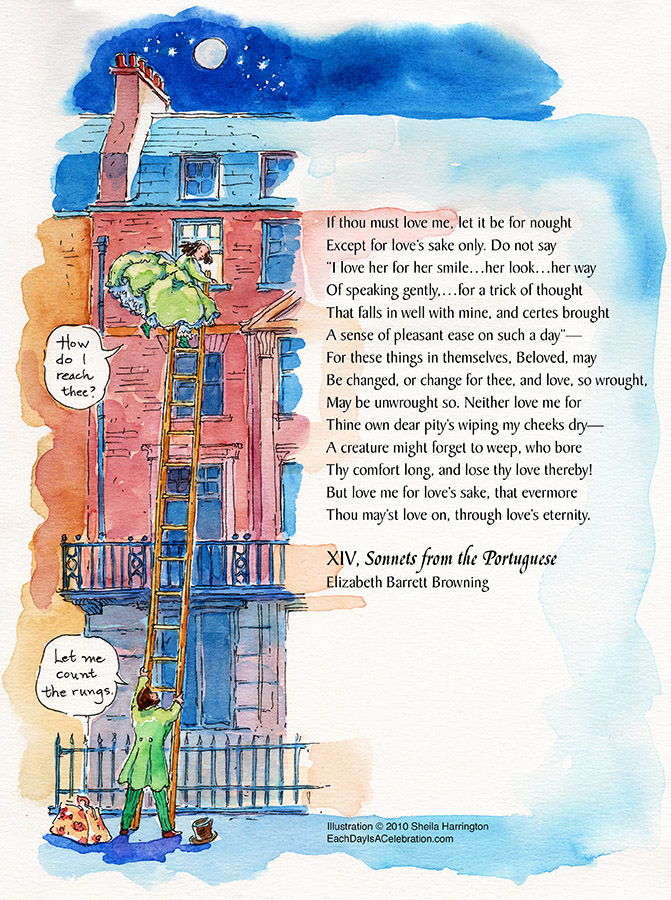
How is this for a romantic tale: Intellectual semi-invalid is still living at home in seclusion in her mid-thirties, quietly writing poetry and essays. Her published, widely read poems catch the attention of a handsome fellow-poet, six years her junior, who writes her a lengthy letter that says, among other things:
I love your verses with all my heart, Miss Barrett… so into me it has gone, and part of me it has become… and I love you too.
Thus began a correspondence—reluctant on her side, urgent on his, between Elizabeth Barrett (1806-1861), whose birthday it is today, and Robert Browning—that culminated in their growing mutual attachment and eventual secret elopement. Like many (all?) romantic tales, it had its dark underside, this one of slavery, paternal tyranny, multiple sad deaths, and mysterious illness.
Barrett was the first-born in a large prosperous family in Coxhoe, England, whose income derived partly from slave-worked plantations in Jamaica (perhaps this was related to Barrett’s later abolitionist stance). She was educated at home and demonstrated in childhood a gift for language: writing poetry, reading Milton, Shakespeare, and Dante, and learning Greek, Latin, and Hebrew (incorporated later into her poetry) sufficiently well to take up translation and analysis. To these she later added Italian, German, and Spanish.
But by age twenty she was already declining physically from some unknown, untreatable cause. The deaths of her mother and grandmother took their toll on her, and the accidental drowning of a favorite brother made her a recluse in her misery. In the meantime the abolition of slavery in England brought an end to the Jamaica income and obliged the family to live simply. Throughout all this she continued to write and publish essays and poetry, passionate, deeply felt, finely crafted, expressive of political and social as well as personal themes. And despite her seclusion, she corresponded widely with other writers and scholars.
Thus Browning was smitten. When he finally whisked Barrett off secretly to tie the knot and honeymoon in Italy, her father disinherited her—as he did each of his children who chose to marry. Some family therapy would not have been amiss here.
After their marriage Barrett showed Browning the sonnets she had been writing, the most famous of which (not the one above, but number XLIII) has been widely reproduced (and parodied). The couple stayed in Italy and, despite their late start, Barrett/Browning gave birth to a little Robert when she was 43. So their tale concludes probably as happily as any—with the two of them madly in love, raising their babe, writing poetry together, respected, reasonably comfortable, and in ITALY besides. Happy Birthday (and apologies), Elizabeth Barrett Browning, with gratitude not only for the poetry but for the love story.

